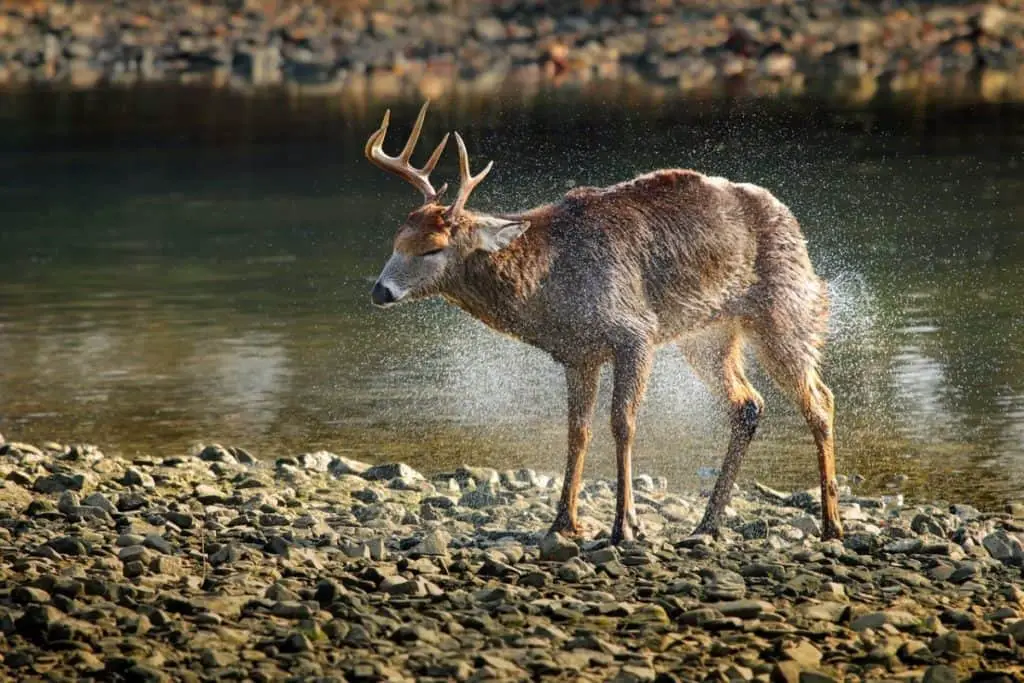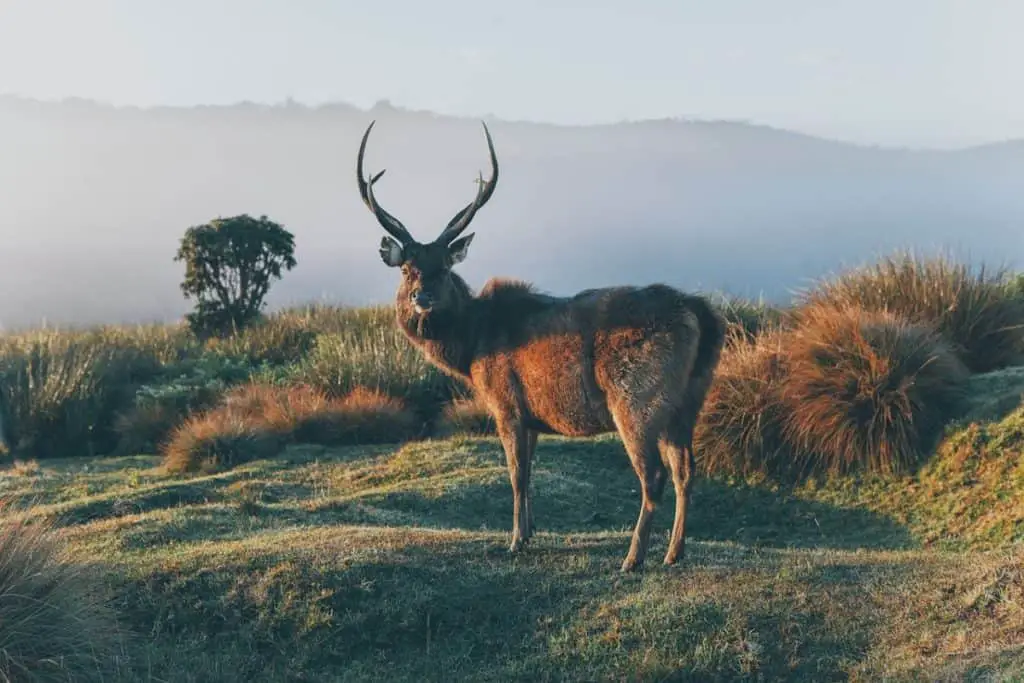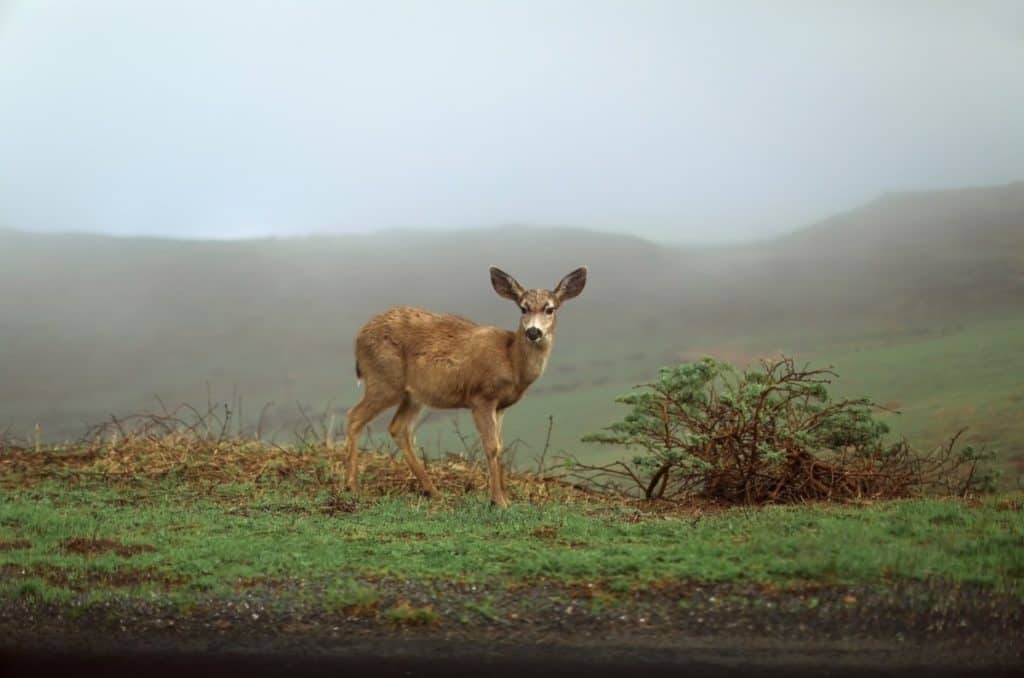
So you’re interested in finding out if deer are herbivores, carnivores, or omnivores. In this article, you’ll find the exact answer to this question and I’ll also answer a few more closely related questions, so make sure you keep on reading till the end.
Are deer herbivores, carnivores, or omnivores? Deer are considered to be herbivores because they generally only eat plant-based food sources. They can’t be classified as carnivores because they don’t mainly eat meat from other animals and they’re also not omnivores because they don’t eat meat and plant-based foods.
There are, however, people that like to call deer omnivores because deer have been seen eating meat before whenever they don’t have any other choice. It is, however, not the case that their goal is to eat both plant-based food sources and meat-based food sources as their teeth and their digestive system are not based on eating meat-based foods.
Check out the video below which explains why herbivores sometimes will eat meat.
Are musk deer herbivores, carnivores, or omnivores?
Musk deer are not considered to be carnivores because they do not hunt other animals for their meat. They are also not considered to be omnivores because they don’t eat both animal meat and plant-based food sources. They are considered to be herbivores because they only eat plant-based foods.
It is, however, possible that musk deer will eat meat when they truly need to survive. But you won’t see this often as they don’t have teeth to correctly chew meat.
Are tufted deer herbivores, carnivores, or omnivores?
Tufted deer are herbivores because the primary food source that they like to consume are plant-based foods. They are not carnivores because they don’t like to eat meat-based foods and they’re also not considered to be omnivores because they don’t like to eat plant-based and meat-based foods.
Just like all the other deer species that are out there, tufted deer do not have a digestive system that is built for digesting meat and also they have teeth that are based on eating plant-based foods only.
Are mule deer herbivores, carnivores, or omnivores?
Mule deer are considered to be herbivores because they only like to eat plant-based food sources. They are not classified as carnivores because they won’t hunt animals for their meat, and they are not omnivores because they won’t eat both plant-based foods and meat-based foods.
Also, mule deer have been seen eating meat-based foods whenever the situation asks for it, so mule deer can be seen as opportunistic omnivores but then again you can pretty much give this classification to every omnivorous animal as every omnivore will eat meat when they have no other choice.
Are hog deer herbivores, carnivores, or omnivores?
Hog deer are herbivores because they only live from plant-based foods. They cannot be considered to be carnivores because they don’t hunt for meat and will choose plant-based foods over meat if they have the choice. They’re also not omnivores because they don’t eat both meat and plant-based foods.
Just like all the other deer species, hog deer do not have any carnivorous teeth and they’ll also have a digestive system that is made to effectively digest plant-based foods.
Are white-tailed deer herbivores, carnivores, or omnivores?
White-tailed deer are herbivores because they only like to consume plant-based foods just like all the other deer species that are out there. They are not carnivorous because they don’t eat meat and they’re not omnivores because they don’t eat both plant-based foods and meat.
White-tailed deer are very easy to identify because of their whitetail. So, you can be sure that if you’re seeing a deer without a whitetail that it isn’t a white-tailed deer.
If you can’t get enough of learning about deer then I encourage you to check out the “Deer Category Page” which consists of various articles that give answers to deer-related questions.
Are red deer herbivores, carnivores, or omnivores?
Red deer are not considered to be carnivores or omnivores because they don’t like to eat meat. They are, however, considered to be herbivores because they only like to consume plant-based food sources.
Red deer are one of the largest deer species that are out there which kind of makes them easy to identify. So, you should make sure to not come close to them because if they see you as a threat then you can be sure that they’ll lash out.
Are muntjac deer herbivores, carnivores, or omnivores?
Muntjac deer are herbivores because they only like to eat plant-based food sources. They are not classified as carnivores because they don’t eat meat-based foods, and they’re also not classified as omnivores because they don’t eat both meat-based and plant-based foods.
Muntjac deer are also known as barking deer because they’ll make barking sounds when it’s midnight or even when the sun is up.

Are water deer herbivores, carnivores, or omnivores?
Water deer are herbivores because they only eat plant-based foods. They are not considered to be carnivores because they’ll choose plant-based foods over meat-based foods, and they’re not omnivores because they don’t prefer eating both meat-based and plant-based foods.
The water deer is very similar to the musk deer which we also covered in this article. Just like musk deer, water deer have been seen eating meat-based foods whenever the situation asks for it.
Are fallow deer herbivores, carnivores, or omnivores?
Fallow deer are not carnivores or omnivores because they do not like to consume meat. They also do not have the teeth that are needed to effectively chew meat-based foods. They are herbivores because they only prefer to eat plant-based foods.
Now you might be asking why fallow deer are called fallow deer as I was asking myself the same question. They’re named fallow deer because of their pale brown color.
Why are deer herbivores?
Herbivores are animals that only eat plant-based foods and that have both teeth that are built to effectively chew plant-based foods and that have a digestive system that can effectively digest plant-based foods. These are all aspects that are present in a deer and therefore they are herbivores.
Deer have multiple compartments located in their stomachs which all help in correctly digesting grass, leaves, and many more plant-based foods. They also have a special organ called a rumen which is used for digesting tough plants.
Why are deer not carnivores?
Carnivores are animals that have a body that is built to hunt other animals for their meat. They, for example, have teeth that are made to rip through animal flesh, and they have claws to keep a good grip on their prey. Deer are not carnivores because their primary food source isn’t meat.
Deer also have teeth that are built to correctly chew plant-based foods and not built to correctly chew meat-based foods.
Also, deer have a digestive system that is made to digest plant-based foods. Plants are a lot harder to digest when compared to digesting meat. That is why you won’t see a carnivore eating plant-based foods because their body won’t be able to digest the plants correctly.
Why are deer not omnivores?
Deer are not considered to be omnivores because omnivores are animals that only live from eating meat from other animals and plant-based foods. Deer mainly live from plant-based foods and mostly fall prey to carnivores like, for example, lions and tigers.
It is, however, possible to see deer being omnivores at times because they sometimes accidentally eat meat or they’ll eat meat if there are no plant-based foods in their environment and are close to starving.
Can deer be opportunistic carnivores or omnivores?
All in all, it is safe to say that deer cannot be considered opportunistic carnivores because they’ll always eat plant-based foods and carnivores are animals that only eat meat-based foods. They can, however, be considered to be opportunistic omnivores as they’ll sometimes eat meat.
It is, however, rare to catch deer eating meat-based foods as there isn’t a lack of plant-based foods across the world and therefore there is most of the time no reason for them to start eating meat-based foods.

Related questions
Can deer eat meat?
Deer have been seen eating meat before but it is not something you’ll see often in nature as they are herbivores that don’t like to eat meat. Their teeth are not built to chew meat correctly and they’ll only eat meat when the situation asks for it.
Can deer eat fish?
Deer have been observed by many people before and there have been people that have seen deer eating fish along Florida’s lakes. Although deer don’t have the right teeth to chew fish meat correctly, digesting fish meat is a lot easier than digesting plant-based foods.
Check out the video below if you want to see a deer eat fish.
Will herbivores eat meat when they’re starving?
You’ll see pretty much all the herbivores that live on this earth eat meat when they’re starving and can’t find any plant-based food sources. It is, however, unlikely that you’ll run into herbivores eating meat as they’ll mainly prefer eating plant-based foods.
Conclusion
Now you know that deer are considered to be herbivores because their main food source is plant-based foods. They are not considered to be carnivores because carnivores are animals that will only eat meat-based foods, and they’re also not considered to be omnivores because they’ll not primarily eat both plant-based foods and meat-based foods.
